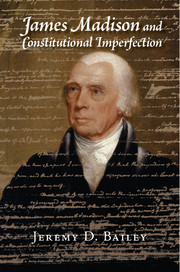Book contents
- Frontmatter
- Dedication
- Contents
- Preface
- Acknowledgments
- Abbreviations
- 1 The Madison Problem
- 2 Appeals to Tradition: The Case for and against Veneration
- 3 Appeals to Elites: The Problem with Deliberation
- 4 Public Opinion before Parties
- 5 The Turn to Public Opinion
- 6 Appeals to the People: Madison and the Revolution of 1800
- 7 Appeals to Text and History
- 8 “Take care of me when dead”
- Index
4 - Public Opinion before Parties
Published online by Cambridge University Press: 05 November 2015
- Frontmatter
- Dedication
- Contents
- Preface
- Acknowledgments
- Abbreviations
- 1 The Madison Problem
- 2 Appeals to Tradition: The Case for and against Veneration
- 3 Appeals to Elites: The Problem with Deliberation
- 4 Public Opinion before Parties
- 5 The Turn to Public Opinion
- 6 Appeals to the People: Madison and the Revolution of 1800
- 7 Appeals to Text and History
- 8 “Take care of me when dead”
- Index
Summary
“Defects themselves gain Strength & Respect by Time. Wd. it not then be better to expose fully, & in the Manner of wh. you are so capable, those Alterations wh. are necessary, or wch. wd in Theory render the Govt. more perfect. The First object shd. be to render the Theory as perfect as possible: if the Theory be such, the practice will be correspondent. Principles wh. are true in Theory, cannot fail in Execution of them.”
Reverend James Madison to James Madison, 1789There is perhaps no greater problem for Madison scholars than Madison's turn to political parties. Within a year after Washington was inaugurated, and less than three years after writing the definitive treatment of faction, Madison joined Thomas Jefferson to create and organize the nation's first opposition party. This turn set in motion the primary intellectual innovation of the decade, which was the defense of public opinion as a legitimate source of authority. As scholars of the period have recently emphasized, this assertion of public opinion as a legitimate source of authority was initially resisted by the Federalist Party, and thus the two arguments became intertwined with the two parties. As Tocqueville noticed, one party was the party of law and the other was the party of opinion.
It is surprising, then, that Madison scholars have not made much use of the period after ratification but before Madison's turn to political parties. In this short time, Madison was a member of Congress and took the lead in getting the new government established. This required settling old business, such as adding amendments to the Constitution, but it also required tough decisions about new business, such as creating executive departments to administer the new government. Both required members of Congress to put meaning to the words of the Constitution. So, for example, and as was discussed in the preceding chapter, the question of the right to instruct representatives carried with it rival understandings of the role and function of representatives. Likewise, creating the executive departments brought to the fore different understandings held by early Americans about the relationship between the president and Congress. In both cases, Madison put together the coalition in the House that eventually won two major legislative victories. One was the Bill of Rights and the other was the 1789 House debate on the removal power.
- Type
- Chapter
- Information
- James Madison and Constitutional Imperfection , pp. 59 - 88Publisher: Cambridge University PressPrint publication year: 2015



